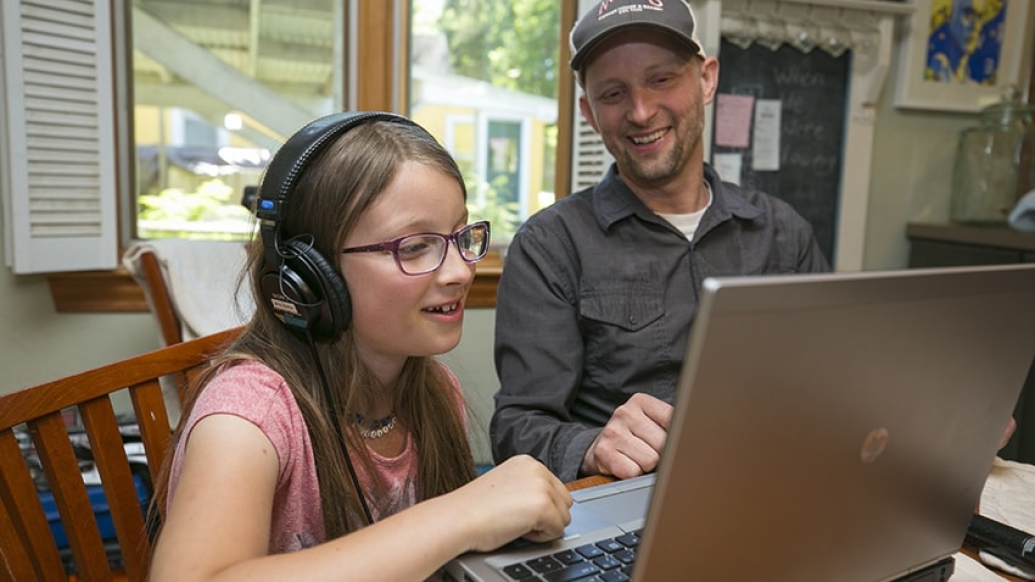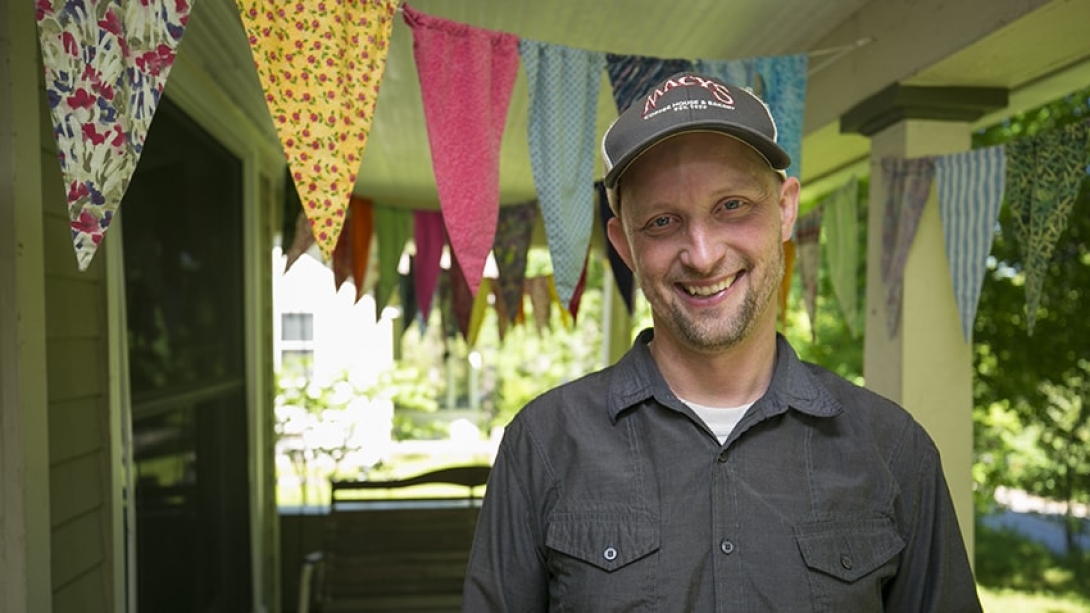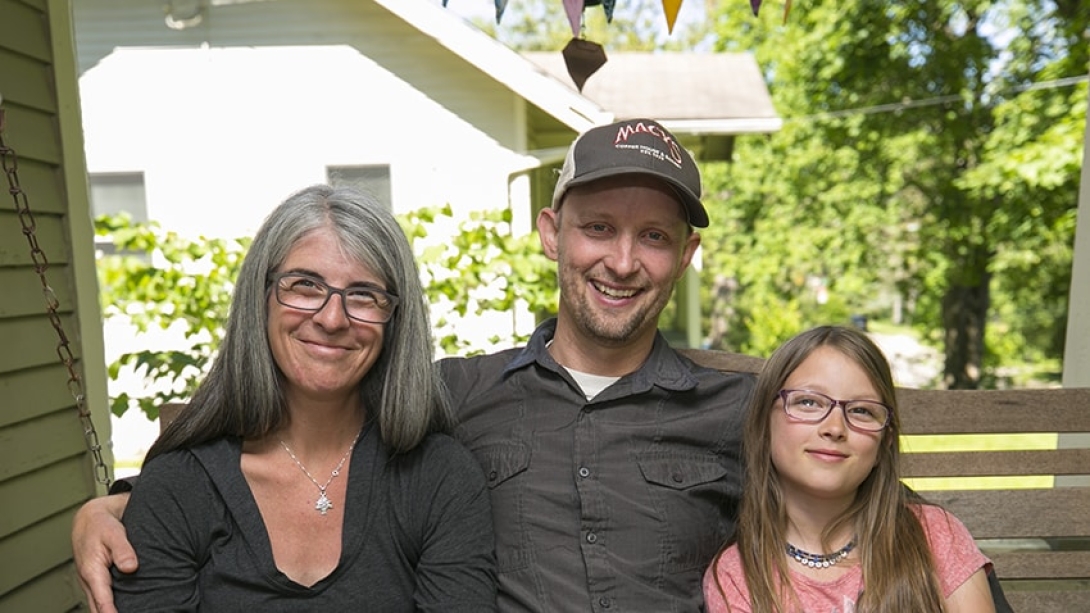In the midst of glioblastoma treatment, radio interviews and editing strengthened a father-daughter bond — and helped their family cope.
7:00 AM
Author |

Brain surgery is a lot for anyone to process. So when Cecelia Brush's dad had to take some time away from his radio job for his surgery, to make sense of it all the 11-year-old grabbed a microphone and hit record.
MORE FROM MICHIGAN: Sign up for our weekly newsletter
Her dad, Mark Brush, is the director of digital media at Michigan Radio. He'd taught his two children, Cecelia and Elias, 13, how a radio story is made. Which is how he became the subject of a deeply personal one.
The family hopes it will help other families going through something similar.
Brush had a glioblastoma, or a fast-growing brain cancer. The 17-year veteran of Michigan Radio just finished radiation after his surgery in March.
"Mark had a concerning lesion in his brain, positioned in one of the toughest locations to operate on," says his surgeon, Daniel Orringer, M.D., assistant professor of neurosurgery at the University of Michigan Medical School. Orringer participated in the radio piece, too: sitting for a tough interview with Cecelia about his inspiration for becoming a neurosurgeon and her dad's case.

Much-needed answers
Brush's tumor moved quickly.
"Mark probably only had the tumor for a matter of months," Orringer says. "It was rapidly evolving, and it's typical for a patient to put symptoms on the back burner."
Brush says, looking back, there were symptoms for about a month before he went to the emergency department.
"I had some funny sensations in my mouth," he says. "I was talking to colleagues at work, and I'd all of a sudden have a feeling where I couldn't say the words I wanted to say." Brush compares the feeling to being outside in the wintertime and having a hard time enunciating because your lips are so cold.
When he looked in the mirror one morning and saw his lip drooping, Brush knew something more serious might be going on.
"At first, I was relieved to find out what was causing the problem," he says. "The fact that it was a glioblastoma and cancer sunk in for me later."
His children immediately had a lot of questions about what was going to happen and why. The informal interviews eventually turned into formal ones.
"Cecelia figured this was her chance to make an actual story," Brush says, and he was ready to help as much as he could. His radio kit was sitting idle, and she already had an idea how to use the equipment to make a package.
A new project
Cecelia applied all of her dad's radio lessons to her new project: telling her dad's story.
SEE ALSO: Former Boxer Gives Brain Tumor a Counterpunch
Good-quality sound is vital to a good radio segment, she says. "And you have to make sure everything will make sense to the audience. You may know what you're writing about, but the audience doesn't."
Cecelia knew she had to bring in Orringer to describe the surgery process in detail, providing some sound bites for her story.
"Cecelia took this interview really seriously, and it was clear she looks up to her dad for working in the field and was honoring what he does with the story she made," says Orringer, who hosted the Brush family in his office one day. "She's so mature."
Glioblastoma is a tough diagnosis and a tough interview topic. To attack the tumor, Orringer and Brush opted for awake brain surgery.
"If [my dad] hadn't gone to the hospital as early as he did, it could've been much worse, but he still would've had to have brain surgery," Cecelia reports in her radio piece. "It has been a rough time for the whole family."
"I think it comes from … when you weren't expecting anything different in a certain day, and then you find out that everything has kind of shifted," Brush's wife, Andrea Tom, told her daughter into the microphone. Cecelia reported that her mom is doing everything she can to keep the family happy and healthy.

Moving forward
Patients are awake during some brain surgeries so the medical team can test the parts of the body affected by the portion of the brain being operated on. For Brush, this meant answering questions during the procedure, moving his arms and fingers on his left side and giving a thumbs-up on command.
"It was crazy to be awake," Brush says, "but it was actually comforting to know I was helping Dr. Orringer as he worked on my tumor."
"Our team kept him awake so we could be sure nothing we did during the surgery would harm Mark's ability to talk or move," Orringer says. "We were able to remove the most aggressive parts of the tumor."
Brush told Cecelia in her segment that he's happy he got his surgery over with quickly. He's continued on with chemotherapy, radiation and an immunotherapy clinical trial. "The combination of surgery, radiation and chemotherapy can really deal a blow to these tumors," Orringer says.
Brush recently returned to work part-time as he finished radiation. Getting back into a routine has been a huge help, he says.
"Ultimately, we really aim to maximize quality of life for our patients," Orringer says. "It was important to me to provide the Brushes with this quality time together."
Cecelia says she and her brother are already thinking of their next radio project. Audio storytelling has become a family activity, with Brush assisting on both the technical aspects, like sound quality, and the tricks of the trade, such as how to get the most information you can out of an interview.
She also has her eye on the long term.
"I might want to do what my dad does," Cecelia says.

Explore a variety of healthcare news & stories by visiting the Health Lab home page for more articles.

Department of Communication at Michigan Medicine
Want top health & research news weekly? Sign up for Health Lab’s newsletters today!





